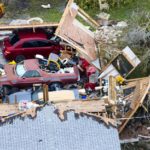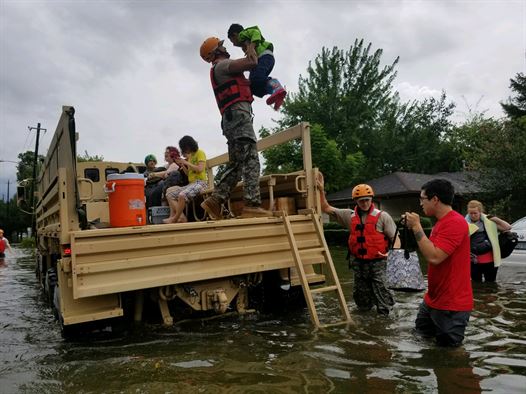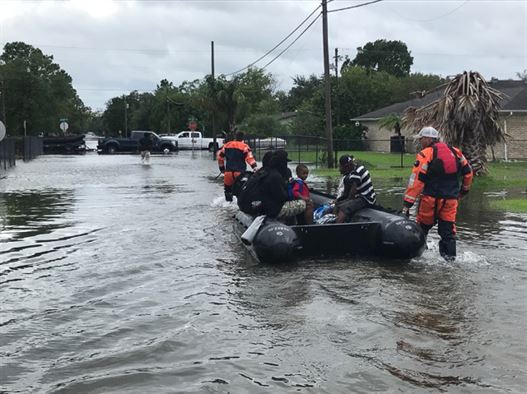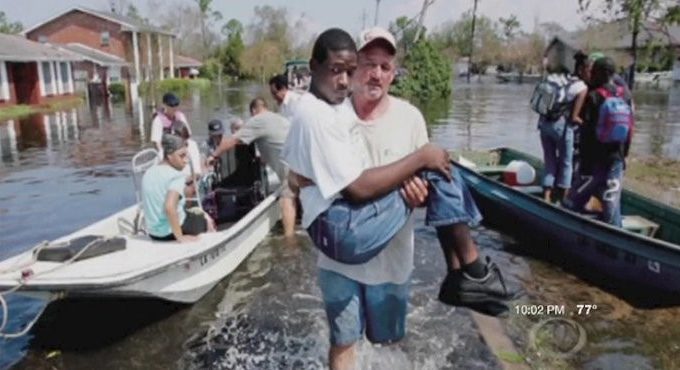While Antifa and Black Lives Matter rage against America, and overpaid NFL players show their contempt for the national anthem, ordinary citizens are displaying the Good Samaritan culture of America. They are stepping up to serve their neighbors, friends, and strangers devastated by recent disasters and atrocities.
 Within 30 days, three of the most devastating hurricanes in history roared out of the Atlantic to strike US soil. The devastation—in Texas, Louisiana, Florida and Puerto Rico—was unparalleled in US history. First responders included private citizens who opened their wallets and homes, and gave their time, energy and skills to the needs of others. Some put their lives in danger. One group of Louisiana boat owners—the Cajun Navy—took their boats to Texas and rescued people from their flooded homes.
Within 30 days, three of the most devastating hurricanes in history roared out of the Atlantic to strike US soil. The devastation—in Texas, Louisiana, Florida and Puerto Rico—was unparalleled in US history. First responders included private citizens who opened their wallets and homes, and gave their time, energy and skills to the needs of others. Some put their lives in danger. One group of Louisiana boat owners—the Cajun Navy—took their boats to Texas and rescued people from their flooded homes.
 Good Samaritan churches and organizations
Good Samaritan churches and organizations
Often, churches were on the ground first, especially those in the neighborhoods where disaster struck. Thousands of churches from near and far, representing most denominations, responded quickly with money and volunteers.
The Southern Baptist Church alone has 95,000 volunteers trained to respond to disasters. Their website states,
Southern Baptist Disaster Relief is Christian love in action. This ministry meets the urgent needs of hurting humanity in crisis situations. Christ calls for believers to demonstrate His love to those affected by disasters through our timely use of resources, talents and time. We provide many different types of relief, including food, water, child care, laundry, repairs, rebuilding and more.
Only one church does more: the Salvation Army. It has 450,000 members focused on meeting human need. The only nonprofit with a larger response is the Christian-founded Red Cross.
Greg Forrester, CEO of the National Voluntary Organizations Active in Disaster, notes that “About 80% of all recovery happens because of nonprofits, and the majority of them are faith-based.”
Private businesses also engage in disaster preparation, relief and recovery, including Hobby Lobby, Walmart, Apple, AT&T, Ashley Furniture, Chevron, Dick’s Sporting Goods and other corporations that pledged over $160M in relief effort.
Good Samaritan government
Professional first responders—police and firefighters—represent local, county and state governments. Before a hurricane, for example, these everyday heroes move proactively to prepare the community. Who can forget the heroes running into the twin towers as office workers rushed out? We owe them high honor.
 Federal government agencies include the National Weather Service that tracks storms to help people prepare. The Federal Emergency Management Agency (FEMA), provides overall coordination of both non-government and government first responders. FEMA does the heavy lifting to mobilize military response to deliver food and water, and evacuate those in the path of danger.
Federal government agencies include the National Weather Service that tracks storms to help people prepare. The Federal Emergency Management Agency (FEMA), provides overall coordination of both non-government and government first responders. FEMA does the heavy lifting to mobilize military response to deliver food and water, and evacuate those in the path of danger.
This is the United States of America. Our nation has a culture, going back to her founding, of servanthood and volunteerism. Alexis de Tocqueville, the French social observer and historian, observed the pattern of neighbor helping neighbor rooted in American culture:
The love and respect of your neighbors must be gained by a long series of small services, hidden deeds of goodness, a persistent habit of kindness, and an established reputation of selflessness.
I have seen Americans making great and sincere sacrifices for the key common good and a hundred times I have noticed that, when need be, they almost always gave each other faithful support.
De Tocqueville also noted that in addition to neighbors helping neighbors, Americans naturally banded together. They were quick to form associations. Tocqueville called these “little platoons,” ordinary people cooperating to solve local problems.
In the United States, little platoons include the Boy and Girl Scouts, the YMCA and YWCA, Shriners, Lions, Kiwanis, Rotary Club and many more. They also include private voluntary organizations like World Vision, Catholic Social Services, Food for the Hungry, Samaritan’s Purse, and hundreds, probably thousands more.
De Tocqueville lamented a lack of volunteerism in his own country, France, as well as in Great Britain. When the French faced a problem they looked to the central government for solutions. The British expected the aristocracy to act. If the French government, or the British aristocracy, did not act, the problems were not solved.
Even today not all countries have a culture of volunteerism. Only a worldview that recognizes the dignity of human life will act decisively to protect its people. Some cultures flounder in fatalism—“there’s nothing I can do to change the situation.” Some lack a robust concept of the future and are not inclined to plan. Such cultures cannot sustain individual or civil organizations that respond to human need. They may mimic a volunteer culture for a time, but without the foundation undergirding such efforts, they will ultimately fail.
No Samaritan strategy in China
China is an example of a culture that does not produce the good Samaritan. John Sexton explores this issue in his article, “Why are there no good Samaritans in China?”

China lacks a culture of compassion. In 2011 an amateur video captured a two-year-old child being run over by a truck. Such accidents happen everywhere. The real horror is that no one stopped to help the dying child. Like the priest and the Levite in the story of the Good Samaritan, the public saw the child and passed by. More recently a woman was struck by a car on a busy street. Dozens of people passed, no one stopping to help. She died when an SUV ran over her as she lay in the road. The video of this incident went viral in China.
China and other nations lack compassion because they lack a biblical worldview. It has been said that a world without Christ is a world without compassion.
Ma Ai, a sociologist at the China University of Political Science and Law, has observed:
In the West, law, faith and morality are a three-legged stool …. Our legal system is catching up, but we don’t have religion and a new moral system has not established after China transformed away from a traditional, collectivist society.
It is the Judeo-Christian worldview and moral code that creates the cultural framework we have witnessed in response to Hurricanes Harvey and Irma. And the Las Vegas shooting. Ben Shapiro champions
The stranger who threw his body atop Amy McAslin and Krystal Goddard to shield them from the rifle fire. “Just truly incredible,” McAslin later said, “a stranger, jumping over me to protect me.”
The off-duty nurse from Orange County who told local news that she ran back into the danger to help the wounded: “I’m a nurse and I just felt that I had to … There was so many people, just normal citizens, doctors, cops, paramedics, nurses, just off duty. … It was completely horrible, but it was absolutely amazing to see all those people come together.”
The anonymous man who threw 18-year-old Addison Short over his shoulder and carried her to safety. The couple who pulled their truck over to carry the wounded to the hospital. The off-duty police using their own bodies to cover the vulnerable. The father who protected his children from gunfire, saying, “They’re 20. I’m 53. I lived a good life.” Jonathan Smith, a 30-year-old who reportedly saved up to 30 lives, taking a bullet to the neck in the process.
We rightly salute such heroism. This spirit of risking life and fortune for others is not found in all cultures. It is rooted in a culture born out of the life and example of Jesus Christ who gave His life to save others.
But how long can it continue in the USA, where we have largely cut ourselves off from our roots? Our culture of virtue is dying. Today we are functioning more like the French of old. People tend to hold the federal government responsible for solving individual and community problems. In fact, a movement underfoot in the US regards small platoons as a hindrance to the progressive agenda of bigger and bigger government. People who function from a fundamentalist atheistic paradigm actually want to crush these little platoons. But that’s a subject for another post.
- Darrow Miller






